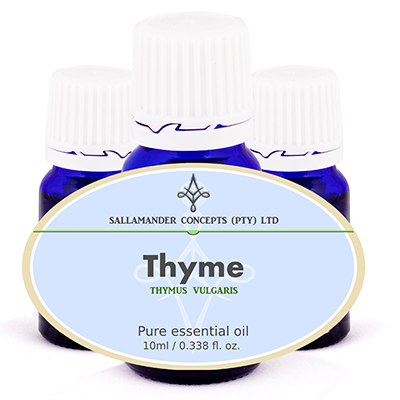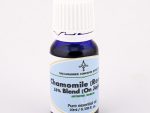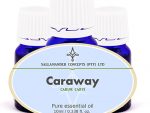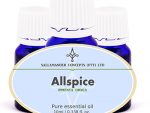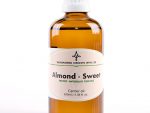Information on Thyme essential oil
Thyme essential oil is extracted from Thymus vulgaris (also known as Thymus aestivus, T. ilerdensis and T. velantianus) of the Labiatae family and is also known as common or red thyme.
Thyme essential oil can cause skin irritation, yet has great value to help with concentration and to focus, as well as being an excellent bronchial and lung stimulant, making it valuable in bronchitis, coughs, colds, asthma and the like, while the warming qualities are great for rheumatism, sciatica, arthritis and gout
Oil Properties
It has a rather sweet, yet strongly herbal smell and is reddish-brown to amber in color.
Origin
It is an ancient herb used in medicine by the Greeks, the Egyptians and the Romans.
Thyme is an evergreen perennial shrub that grows up to 45 cm (18 inches) high, with a woody root system, much-branched stem, small elliptical greenish gray aromatic leaves and pale purple or white flowers.
The name is derived from the Greek word ‘thymos’ that means ‘perfume’ and was used as an incense in Greek temples.
The Egyptians used it in embalming process.
During the Middle Ages it was given to jousting knights for courage, and a sprig of the herb was carried into courtrooms to ward off diseases.
Extraction
Thyme essential oil is extracted from the fresh or partly dried flowering tops and leaves of the plant by water or steam distillation and the yield is 0.7 -1.0 %.
Chemical Composition
Some of the main chemical components are Geranyl acetate, Geraniol, β-Caryophyllene, Terpinen-4-ol, Linalool
Precautions
Thyme essential oil may influence the absorption of drugs metabolized CYP2B6, which include artemisinin, bupropion, cyclophosphamide, efavirenz, ketamine, and methadone.
There is a concern that thyme oil may increase the production of bile and may cause problems if the bile duct is blocked.
Thyme essential oil does have GRAS status, although geraniol is listed to be a mild skin irritant.
As with most essential oils, this essential oil should be kept in a dark and cool place and should be stored in an airtight dark glass bottle (Preferably in the fridge at a temperature of around 4° Celsius / 39° Fahrenheit).
Please read our page with heading: Safety with Essential Oils before using this oil.
We recommend the following book as an excellent resource regarding safety:
Essential Oil Safety: A Guide for Health Care Professionals by Robert Tisserand & Rodney Young (#ad)
Therapeutic properties
The therapeutic properties of thyme oil are antirheumatic, antiseptic, antispasmodic, bactericidal, bechic, cardiac, carminative, cicatrisant, diuretic, emmenagogue, expectorant, hypertensive, insecticide, stimulant, tonic and vermifuge.
For our glossary and explanation of these therapeutic terms, please click here
Uses
Thyme essential oil strengthens the nerves, aids memory and concentration, can help with the feeling of exhaustion and combats depression, while it fortifies the lungs and helps with colds, coughs, asthma, laryngitis, sinusitis, catarrh, whooping cough, sore throats and tonsillitis.
Thyme oil is beneficial to boost the immune system and can help fight colds, flu, infectious diseases and chills and as a urinary antiseptic, it is very helpful for cystitis and urethritis.
The warming effect of this oil can help in cases of poor circulation, as well as for arthritis, rheumatism, gout, muscular aches and pains, sprains and sport injuries.
It is also helpful for cellulite, anorexia, obesity and edema and in cases of scanty periods, leucorrhoea, and to speed up birth and to expel afterbirth.
Burners and vaporizers
In vapor therapy, thyme oil can be helpful with bronchitis, coughs, respiratory problems, sinusitis, mucus congestion and muscular aches and pains.
Blended in Massage Oil
As a blended massage oil it can assist with arthritis, bronchitis, colds, flu, coughs, gout, bruises, eczema, mucus congestion, muscular aches and pains, obesity and rheumatism.
Mouthwash or Gargle
Diluted as a mouthwash or as a gargle, thyme essential oil can help with gum infections and tonsillitis (Not to be used by people with bile duct problems or blocked bile dust).
Neat Application
Apply directly, or used neat, thyme essential oil could help with animal bites and boils but use with care, because of the possible of the risk of skin irritation. Use rarely, intermittently and in extremely tiny amounts.
Suggested Dilution Rates
On the skin
Adult:
Face: 0.5% to 1%
Body: 1.5% to 1.3%
Bath: 1.5% to 1.3%
3 to 24 months:
Do not use topically. Avoid use
2 to 6 years:
Face: Maximum of 0.25%
Body: Maximum of 0.25%
Bath: Maximum of 0.25%
6 to 15 years
Face: 0.25% to 0.5%
Body: 0.25% to 0.5%
Bath: 0.25% to 0.5%
Pregnancy
Face: 0.5% to 1%
Body: 0.5% to 1.3%
Bath: 0.5% to 1.3%
- When in doubt consult your doctor / medical professional before use.
- Most professionals and/or Aromatherapists will always err on the side of safety when giving advice regarding the use of essential oils and oleo resins during pregnancy.
- Quite a number of Aromatherapists advise that you should avoid all essential oils completely while pregnant, specifically during the first trimester. This is a very safe approach but may not be necessary at all.
Diffusers and Vaporisers
4 to 8 drops
General:
- When using for the first time – Always use the lowest dilution rate and build up slowly to the maximum. Stop using all essential oils on the skin if irritation or allergy occurs.
- Any advice or instruction received from a medical professional ALWAYS supersedes recommendations or advice found on this website. When in doubt consult your doctor / medical professional.
Summary
Thyme oil can assist with nervous complaints, respiratory problems, poor circulation and problems of the digestive system and the urinary tract.
Blends
Although essential oils normally blend well together, Thyme oil blends particularly well with Bergamot, Grapefruit, Lemon, Lavender, Rosemary and Pine.

